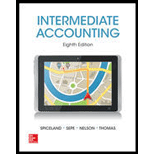
(1)
Nonmonetary Exchange
Exchange of non-monetary assets for another non-monetary asset is known as nonmonetary exchange.
Exchange has commercial substance:
If an exchange (Example: exchange of land for another non-monetary asset other than land) is likely to have a change in the future
Exchange lacks commercial substance:
If an exchange (Example: exchange of land for another land) is expected that it will not change the future cash flows, then such exchange is known as exchange lacks commercial substance. In this case, an exchange lacks commercial substance; therefore new non-monetary asset would be value at the book value of the old non-monetary asset.
To determine: The fair value of the new parcel land, which is received by Company T.
(2)
To prepare: The
(3)
To prepare: The journal entry, to record the exchange of old land for new parcel land, assumes that the exchange lacks commercial substance.
Want to see the full answer?
Check out a sample textbook solution
Chapter 10 Solutions
INTERMEDIATE ACCOUNTING

 AccountingAccountingISBN:9781337272094Author:WARREN, Carl S., Reeve, James M., Duchac, Jonathan E.Publisher:Cengage Learning,
AccountingAccountingISBN:9781337272094Author:WARREN, Carl S., Reeve, James M., Duchac, Jonathan E.Publisher:Cengage Learning, Accounting Information SystemsAccountingISBN:9781337619202Author:Hall, James A.Publisher:Cengage Learning,
Accounting Information SystemsAccountingISBN:9781337619202Author:Hall, James A.Publisher:Cengage Learning, Horngren's Cost Accounting: A Managerial Emphasis...AccountingISBN:9780134475585Author:Srikant M. Datar, Madhav V. RajanPublisher:PEARSON
Horngren's Cost Accounting: A Managerial Emphasis...AccountingISBN:9780134475585Author:Srikant M. Datar, Madhav V. RajanPublisher:PEARSON Intermediate AccountingAccountingISBN:9781259722660Author:J. David Spiceland, Mark W. Nelson, Wayne M ThomasPublisher:McGraw-Hill Education
Intermediate AccountingAccountingISBN:9781259722660Author:J. David Spiceland, Mark W. Nelson, Wayne M ThomasPublisher:McGraw-Hill Education Financial and Managerial AccountingAccountingISBN:9781259726705Author:John J Wild, Ken W. Shaw, Barbara Chiappetta Fundamental Accounting PrinciplesPublisher:McGraw-Hill Education
Financial and Managerial AccountingAccountingISBN:9781259726705Author:John J Wild, Ken W. Shaw, Barbara Chiappetta Fundamental Accounting PrinciplesPublisher:McGraw-Hill Education





